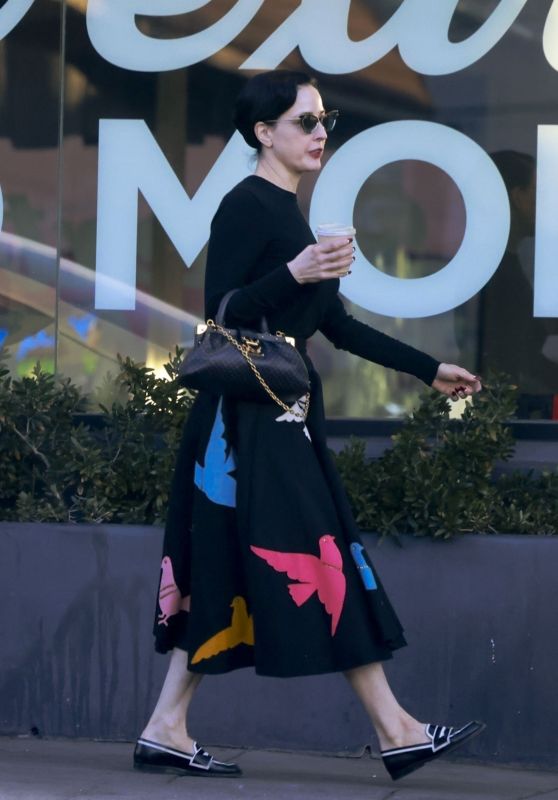The 2024 Golden Globe Awards are the gift that keeps on giving.
Possibly the worst-produced awards telecast in my lifetime, the 81st Golden Globes generated a stench that allowed every other 2024 awards show to rest on the laurels that, if nothing else, they were better than the Globes. And they all were! Every single one.
It’s only fair, then, that the final beneficiary of the 2024 Golden Globe Awards were … the 2025 Golden Globe Awards.
A generally dull and poorly paced show awash in self-inflicted blunders, the 2025 Golden Globes telecast was still a tremendous improvement over last year’s event, with almost all the credit going to Nikki Glaser, reminding audiences once again of the importance of above-average hosting.
Jo Koy was a sacrificial lamb last year. He was handed a gig he wasn’t well-suited for long after the point at which he could have properly prepared. Then he was handed material that was fully divorced from his voice and skillset. Then he decided to put a stake in the whole misbegotten experience by specifically blaming the writers for patter that was bad but that he made worse.
As anybody who has ever watched Glaser’s stand-up and roast appearances knows, this was not a gig she was inherently well-suited for either. Of all current stand-up stars, Glaser is probably the least CBS-friendly imaginable. It’s been amusing seeing both Glaser and CBS treating her as a relative unknown, which she is not. But she may be a relative unknown to the CBS audience.
What Glaser did — and what Jo Koy was unable to do — was handle a gig that wasn’t perfect for her gifts like a professional. She held the stage, played decently to a crowd that started off a little wary but warmed to her, and actually seemed like she was enjoying the opportunity.
Was the TV-PG version of Nikki Glaser recognizable if you knew Glaser’s earlier material, which has tended to revolve around sex, sex and also sex? Only occasionally. A joke about how she thinks about Glen Powell when she’s having sex with her boyfriend was a softer version of one of her standard pieces of roast material, but that was about as dirty as she got.
Instead, she filled her monologue with nebulous gags about Hollywood politics (“You could really do anything, except for tell the country who to vote for. It’s OK. You’ll get ’em next time. Assuming there is one.”); the blurred lines between film and television; Timothée Chalamet’s facial hair; and how nobody could find Eddie Redmayne’s ultra-secretive assassin in The Day of the Jackal because he was on Peacock.
By the scathing standards set by Ricky Gervais, the platonic ideal of a Golden Globes host for some viewers, Glaser was soft and not hugely topical or specific. From Trump to Elon Musk, big national figures were ignored entirely; the ongoing Baldoni/Lively saga, on the tip of everybody’s tongues in the industry, didn’t get a mention. A closing punchline about the potential criminality of some of the men in the room felt like it was being directed out into the ether, rather than targeting anybody or anything in particular. By design, nobody in the room cringed at anything.
The Globes have also decided that they’re no longer the “We’re a fun party and it’s OK to make fun of us!” Globes of yesteryear. Who they are now is harder to pinpoint. That fact came into play throughout the telecast when one winner after another was stymied by whom, exactly, they were supposed to be thanking for the honor. There were references to the HFPA and to “the press” and several other entities that don’t vote on the Globes anymore. The unilluminating tautology is that the Golden Globes are now voted on by … Golden Globes voters, making any attempt to lampoon those voters like firing an arrow into a fog bank.
So Glaser executed the monologue efficiently and got some laughs. Unlike Koy, though, she didn’t completely vanish. She went through six or seven different outfit changes, and pushed the show forward with enthusiasm. She made Conclave jokes and sang two bars of the parody song “Pope-ular,” which I’d have gladly listened to in its entirety. It wasn’t a hosting performance that demanded Glaser be handed a lifetime contract, but she could be brought back next year and I’d say, “Sure. Why not?”
As for the rest of the show? Simply put, it became a dull march through all-too-familiar television winners — Shōgun, Baby Reindeer, Hacks, The Bear — and film winners that were, if nothing else, on the unpredictable side.
I’ll admit that I make fun when awards shows fill time with strange clip packages and badly conceived In Memoriam segments and pompous tributes. But when you see an awards show that is just one award after another after another, you miss those things. In Memoriam segments are bad almost all the time. Still, they break up the sameness of the show. Musical performances run the risk of causing an energy letdown. Still, they break up the sameness of the show. If an honorary award is given to somebody with no sense of the room or the occasion, it can create an emotional vacuum. But those awards break up the sameness of the show. Admittedly, they also add time, and if the Globes had come in at a tight three hours, I’d say that they’d accomplished some mission. The show did not come in at a tight three hours.
It is beyond my comprehension why the Globes decided to give honorary awards to Viola Davis and Ted Danson at a separate event on Friday and not even play snippets from their speeches. Want to know what the Globes were missing on Sunday night? The crescendo that comes from an industry legend taking the stage and getting a standing ovation. It’s a thing the Globes have always done well, and just as it’s a mistake that the Oscars have eliminated those lifetime achievement prizes from the main telecast, the Globes erred in joining that desultory trend.
This forced the entire show to hang on that most precarious of award show pegs — scripted presenter banter.
There were a few funny gags. Seth Rogen and Catherine O’Hara’s intro involving Canadian award shows felt like it lasted forever, but I laughed. Anthony Mackie and Harrison Ford were funny, though not necessarily intentionally so. I think I chuckled when Jennifer Coolidge said something about once being part of a show where Billy Bob Thornton was allowed to bring his pet coyote to the set, but that chuckle might have come from not knowing if it was a joke at all and from the director not even having a cut-away to Thornton handy. Maybe he went to the bathroom? Maybe he left? More likely, the cameras just weren’t in the right place.
More than anything, the presenters and their material collectively pointed to poor teleprompter work, a lack of rehearsal, or both. (Not, mind you, that rehearsal would improve lines like, “In a night that’s given us some amazing moments, let’s continue with the amazingness.”)
Have you ever watched an award show and thought, “Gee, I wonder why the presenters are all standing in the middle of a stage and talking to the camera in a way that suggests speaking to both the audience in the venue and the audience at home?” No. You have not. Because it’s not a problem. The Golden Globes producers decided to create a problem where none existed by having each presenter seemingly speaking from a slightly different part of the stage, looking in a slightly different direction at a camera that was placed slightly differently. When I say that not a single presenter the entire night appeared to know where they were supposed to be or whom they were supposed to be talking to, I’m not exaggerating. Every. Single. Presenter. Looked. Unsteady. Only Seth Rogen called out how inelegant it was, because only Seth Rogen felt comfortable enough for improv.
Meanwhile, the producers’ attempts to solve one of the show’s biggest annual problems — the Beverly Hilton ballroom is small and cramped and it can take a long time for winners to get to the stage — produced new problems. Entertainment Tonight‘s Kevin Frazier served as an announcer of sorts, filling the dead air with trivia about winners, except that the trivia was banal, the audio was inconsistent and winners sometimes weren’t sure if they were supposed to let the blather continue before their speeches. The pop-up text trivia onscreen was somehow even more useless. I liked the “drop a pin” identification of where audience members were sitting, because it reminded me of forgetting where I parked my car; that’s the kind of drama I crave in an awards show.
Ultimately, your memories of this telecast will probably hinge on how memorable you found the winners and speeches.
Generally, everybody followed Glaser’s lead and went politics-free. Sure, there were frequent references to our challenging times and concerns about our future. But given that immigration and trans identity were central to the two best picture winners, it was a bit odd that we had to be satisfied with well-wishes like “The light always wins over darkness.”
There were still good speeches.
Demi Moore, winning for The Substance, was the clear standout, recalling being told by a producer decades ago that she was a “popcorn actress.” She closed with the wisdom, “I had a woman say to me, ‘Just know that you will never be enough, but you can know the value of your worth if you just put down the measuring stick.'”
Colin Farrell hilariously praised the craft service woman who supplied his coconut water; Brady Corbet made his daughter cry and spoke out in favor of directors having final cut; Zoe Saldaña was so overcome with excitement at her own win that she went up on-stage for her film’s best song win; Anna Sawai said she’d vote for Kathy Bates any day; and Shōgun co-creator Justin Marks told a story about looking for a 50-pound tortoise, but never revealed if they found the tortoise.
Maybe that’s a cliffhanger for next year’s show?
Fair warning, though, Golden Globes: You won’t be compared to the 2024 telecast forever. So enjoy the positive vibes.
Golden Globes producer Dick Clark Productions is owned by Penske Media Eldridge, a joint venture between Penske Media Corporation and Eldridge that also owns The Hollywood Reporter.




















 English (US) ·
English (US) ·